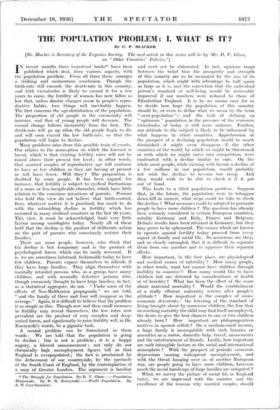THE POPULATION PROBLEM: I. WHAT IS IT ?
By C. P. BLACKER
[Dr. ,Blacker is Secretary of the Eugenics Society. The next article in this series will be by Mr. D. V. Glass, on "Other Countries' Policies.' 1 -IN recent months three important books* have been published which deal, from various aspects, with the population problem. From all three there emerges a striking and momentous conclusion. Though the birth-rate still exceeds the death-rate in this country, and with vicissitudes is likely to exceed it for a few years to come, the fertility of women has now fallen so low that, unless drastic changes occur in people's repro- ductive habits, two things will inevitably happen. The first concerns the age-distribution of the population. The proportion of old people in the community will increase, and that of young people will decrease. The second change follows inexorably from the first. The death-rate will go up when the old people begin to die and will soon exceed the low birth-rate, so that the population will begin to decline.
Many problems arise from this possible train of events. One relates to the assumption on which the forecast is based, which is that existing fertility rates will not be raised above their present low level ; in other words, that married couples of reproductive age will continue to have as few children as they are having at present or Will have fewer. Will they ? The proposition is doubted by some people. It has been argued, for instance, that fertility is subject to cyclical fluctuations of a more or less inexplicable character, which have little relation to the conscious intentions of parents. Persons who hold this view do not believe that birth-control, from whatever motive it is practised, has much to do with the astonishing decline in fertility which has occurred in many civilised countries in the last 60 years. This view, it must be acknowledged, finds very little favour among sociologists today. Nearly all of these hold that the decline is the product of deliberate action on the part of parents who consciously restrict their There are some people, however, who think that the decline is but temporary and is the product of psychological forces which can be easily reversed. It We are sometimes informed, fashionable today to have few children. Parents expose themselves to ridicule if they have large families. They align themselves with mentally retarded persons who, as a group, have many. children, and with mentally defective persons who, though commonly thought to have large families, in fact, as a statistical aggregate, do not. "Undo some of the effects of Neo-Malthusian propaganda" we are told, "and the family of three and four will reappear as the average." Again, it is difficult to believe that the problem is as simple as this. Though now and then small increases in fertility may reveal themselves, the low rates now prevalent are the product of very complex and deep- seated forces, and significantly to raise fertility will, in Dr. Kuczynski's words, be a gigantic task.
A second problem can be formulated in these words : We are told that the population is going to decline ; this is not a problem ; it is a happy augury, a blessed announcement ; not only do our chronically high unemployment figures tell us that England is overpopulated ; the fact is proclaimed by the defacement of our countryside, by the spectacle of the South Coast of England, by the contemplation of a map of Greater London. The argument is familiar * The Struggle for Population. By V. Glam.—Population Movements. By R. R. Kuczynski.—World . Population. By A: M. Carr-Saunders. and need not be elaborated. In fact, opinions range between the belief that the prosperity and strength of this country are to be measured by the size of its population, which might with advantage be half again as large as it is, and the conviction that the individual person's standard of well-being would be noticeably improved if our numbers were reduced to those of Elizabethan England. It is by no means easy for us to decide how large the population of this country should be, or even to define what we mean by the term " over-population "; and the task of defining an " optimum " population in the presence of the economic vicissitudes of today is still more arduous. Further, our attitude to the subject is likely to be influenced by what happens in other countries. Apprehension at the prospect of a declining population would be much diminished—it might even disappear—if the other countries of the world, by which we might be threatened or with which we might enter into competition, were confronted with a decline similar to ours. On the whole most people, while viewing with favour a decline of a few millions in our population, would probably not wish the decline to become too steep. And they would wish to be able to check it if it got out of hand.
This leads to a third population problem. Suppose that, in the future, the population were to toboggan down-hill in earnest, what steps could we take to check the decline ? What measures could be adopted to persuade people to have more children ? The question has already been seriously considered in certain European countries, notably Germany and Italy, France and Belgium. Definite results have been attained in Germany, but they may prove to be ephemeral. The causes which are known to operate against fertility today proceed from every aspect of family and social life. So numerous are they, and so closely entangled, that it is difficult to separate them from one another and to appraise their separate effects.
How important, in the first place, are physiological and medical causes of infertility ? How many people, in other words, want but cannot have children through inability to conceive ? How many would like to have children but are deterred by considerations of health or of heredity ? What has been the effect of the scare about maternal mortality ? Would the establishment of a really efficient maternity service altcr people's attitude ? How important is the complex of socio- economic deterrents : the lowering of the standard of living brought about by numerous children, the fear that on reaching maturity the child may find itself unemployed, the desire to give the best chances to one or two children already born ? How important are philoprogenitive motives as against selfish ? On a medium-sized income, a large family is incompatible with such luxuries or amenities as a motor, domestic help, travel, amusements and the entertainment of friends. Lastly, how important are such intangible factors as the social and international atmosphere ? With the prospect of periodic economic depressions causing widespread unemployment, and with the threat hanging over us of another European war, are people going to have more children, however much the social handicaps of large families are mitigated ?
When we survey the picture of social life in England today, we are impressed with the number and the excellence of the reasons why married couples should have few children. Now that people are equipped with the means of preventing births, the reproductive impulse is seen to be a delicate thing, struggling for expression against numerous checks and obstacles. It may well prove to be incapable of effective resuscitation until drastic changes for the better are introduced into our social and international life. The spread of contraceptive knowledge and of the sense of parental responsibility for the well-being of each individual child—in short, the spread of planned parent- hood—may well result in a further decline in fertility unless the social conditions of the future promise to fulfil the high standards which we are increasingly demanding for our children.











































 Previous page
Previous page